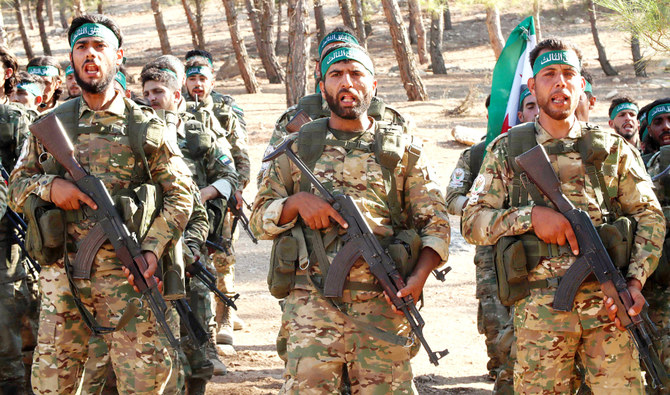ANKARA: Turkey’s intelligence chief has held multiple meetings with his Syrian counterpart in Damascus over the last few weeks, a sign of Russian efforts to encourage a thaw between states on opposite sides of Syria’s war, four sources said.
A regional source aligned with Damascus said that Hakan Fidan, head of Turkey’s National Intelligence Organization, and Syrian intelligence chief Ali Mamlouk met as recently as this week in the Syrian capital.
The contacts reflect a Russian policy shift as Moscow steels itself for a protracted conflict in Ukraine and seeks to secure its position in Syria, where its forces have supported President Bashar Assad since 2015, according to two Turkish officials and the regional source.
Any normalization between Ankara and Damascus would reshape the decade-long Syrian war.
Turkish backing has been vital to sustaining Syrian fighters in their last major territorial foothold in the northwest, after Assad defeated the insurgency across the rest of the country, aided by Russia and Iran.
BACKGROUND
Turkish backing has been vital to sustaining Syrian fighters in their last major territorial foothold in the northwest, after Bashar Assad’s regime defeated the insurgency across the rest of the country, aided by Russia and Iran.
But rapprochement faces big complications, including the fate of rebel fighters and millions of civilians, many of whom fled to the northwest to escape Assad’s rule.
Turkey, a NATO member country, has troops on the ground across the area, deemed occupying forces by Assad.
During the meetings, Fidan — one of President Tayyip Erdogan’s closest confidants — and Mamlouk evaluated how the two countries’ foreign ministers could eventually meet, according to a senior Turkish official and a Turkish security source.
“Russia wants Syria and Turkey to overcome their problems and achieve certain agreements ... which are in the interest of everyone, both Turkey and Syria,” said the Turkish official.
One big challenge is Turkey’s desire to include Syrian rebels in any talks with Damascus, the official added.
The Turkish security official said Russia has gradually withdrawn some military resources from Syria in order to focus on Ukraine, and had asked Turkey to normalise relations with Assad to “accelerate a political solution” in Syria.
The Damascus-allied source said Russia had nudged Syria to enter talks as Moscow seeks to nail down its position and that of Assad in the event it must redeploy forces to Ukraine. Russia has sustained stunning losses on the ground in Ukraine over the past week.
The most recent meetings — including a two-day visit by Fidan to Damascus at the end of August — had sought to lay the ground for sessions at a higher level, the source said.
The senior Turkish official said Ankara does not want to see Iranian or Iran-backed forces — already widely deployed in regime-controlled parts of Syria — plugging gaps left by Russian withdrawals.
The Turkish security official said neither did Russia want to see Iranian influence expand as it reduces its presence.
A diplomat based in the region said Russia had pulled a limited number of troops out of Syria’s south earlier this summer, particularly in areas along the border with Israel that were later filled by Iran-aligned forces. While Fidan and Mamlouk have spoken intermittently over the last two years, the pace and timing of recent meetings suggests a new urgency to the contacts.
The regional source allied to Damascus and a second senior pro-Assad source in the Middle East said the Turkish-Syrian contacts had made a lot of progress, without giving details.
A third regional source aligned with Damascus said Turkish-Syrian relations had begun to thaw and were advancing to a stage of “creating a climate for understanding.”
The Russian Foreign Ministry did not immediately respond to a request for comment.
Turkey’s MIT declined to comment and the Foreign Ministry did not immediately comment.
The Syrian Information Ministry did not immediately reply to emailed questions from Reuters.
Turkish-Syrian rapprochement seemed unthinkable earlier in the Syrian conflict, which spiraled out of an uprising against Assad in 2011, killing hundreds of thousands of people, drawing in numerous foreign powers, and splintering the country. Erdogan has called Assad a terrorist and said there could be no peace in Syria with him in office, while Assad has called Erdogan a thief for “stealing” Syrian land.
But in an apparent change of tone last month, Erdogan said he could never rule out dialogue and diplomacy with Syria.
Erdogan faces tight elections next year in which a key issue will be repatriating some of the 3.7 million Syrian refugees now in Turkey.
The Turkish-Syrian contacts come against the backdrop of a flurry of meetings between Erdogan and Russian President Vladimir Putin, including one planned on Friday in Uzbekistan.
In July, Turkey helped seal a UN-backed deal that lifted a blockade on grain exports from Ukraine’s Black Sea ports..
After a recent visit to Moscow, Erdogan said Putin had suggested Turkey cooperate with Damascus along their joint border, where Ankara has waged several offensives into areas where Syrian Kurdish groups have carved out autonomy since 2011.
Turkey has been threatening to launch another offensive against the US-backed Kurdish forces, which Ankara deems a national security threat.
Russia has signaled opposition to such an incursion.



























